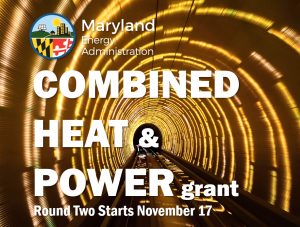Maryland Energy Administration To Open Second Round of CHP Grants November 17
 Brandon Bowser, CHP & Energy Resilience Program Manager
Brandon Bowser, CHP & Energy Resilience Program Manager
The Maryland Energy Administration (MEA) will open the second application round of the Fiscal Year 2021 Combined Heat and Power (CHP) grant on Tuesday, November 17, 2020. Eligible applicants can receive up to $650,000 toward the equipment and installation costs of qualified CHP systems for their facilities. Click here for full details on award amounts.
A CHP system is a type of distributed energy resource (DER) installed onsite to generate clean, affordable, and reliable electricity as well as useful thermal energy from a single source of fuel. Traditionally, organizations get their energy from two separate sources: electricity is purchased from the grid after being generated off-site while thermal energy is produced from onsite combustion systems, like boilers. However, energy produced separately like this requires a substantial amount of fuel. When considered together, the combined energy efficiency of grid electricity and onsite boiler-fired thermal energy is only about 50%. Because CHP systems generate both electricity and thermal energy from a single source of fuel onsite while capturing waste heat, they are highly-efficient. Many operate at about 70-75% combined electrical and thermal efficiency, and sometimes even higher — meaning that the bulk of the fuel is converted to electricity and usable thermal energy. CHP systems thus require less fuel which can generate significant annual utility cost savings. CHP system owners can save from tens to hundreds of thousands, and in some cases over a million dollars per year in operating expenses. Additionally, because the CHP system uses less fuel to produce the same amount of energy that would otherwise be obtained from conventional sources, fewer greenhouse gases are emitted. This makes a CHP system an excellent component in an organization’s sustainability plan. It is easy to see why organizations choose to go CHP.
CHP systems can be configured to operate when the grid goes down, allowing essential facility loads to continue receiving electricity and thermal energy as long as the CHP fuel source remains accessible. CHP is ideal for critical infrastructure like hospitals and wastewater treatment facilities, businesses with critical operations that require uninterrupted power supply, or facilities serving vulnerable populations from power outages. CHPs are sometimes combined with DERs like battery storage or solar PVs, to create comprehensive, grid-interactive energy systems like microgrids, bolstering energy resilience for an entire campus to community to the grid.
Want to learn more about CHP? MEA is presenting a series of three informational webinar sessions in December that discuss CHP technology in detail and provide an overview of the FY21 CHP Grant Program to interested parties. Click here or visit the MEA CHP webpage to register for one or more of these sessions. If you need more information now, check out our CHP Resource Guide.
Applications will be accepted on a first-come, first served basis from November 17, 2020 through February 26, 2021, or until funding is expended, whichever comes first. Interested parties should visit the MEA CHP webpage for more information. Questions can be directed to Brandon Bowser, CHP & Energy Resilience Program Manager via email or phone (443) 306-0304.
Please note the meeting links below will not be live until the specific time of the meeting.
Thursday, December 10, 2020 at 11 AM EST, click here to join meeting
Wednesday, December 16, 2020 at 1 PM EST – 2 PM EST, click here to join meeting
Tuesday, December 22, 2020 at 10 AM EST – 11 AM, please click here to join meeting



 1-888-373-7888
1-888-373-7888 233733
233733